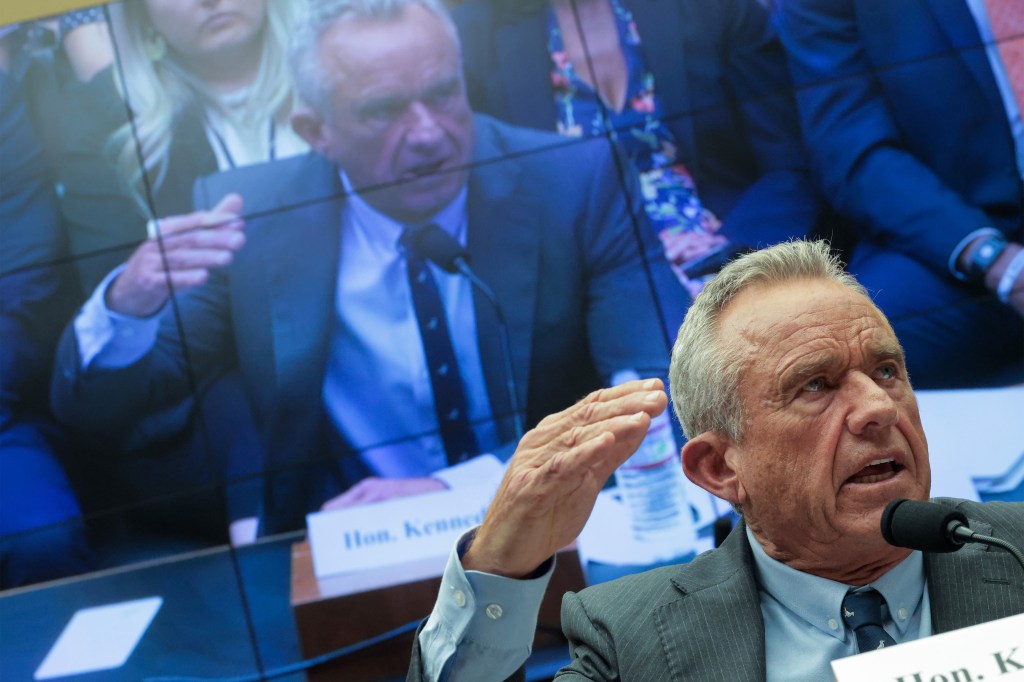On his way to an Ultimate Fighting Championship event, Health and Human Services Secretary Robert F. Kennedy Jr. stopped by the home of podcaster Gary Brecka. The two spent time in a hyperbaric oxygen chamber and tried some intravenous nutrition drips that Brecka, a self-avowed longevity and wellness maven, sells and promotes on his show, “The Ultimate Human.”
Then the podcast taping started, and Kennedy — who was also on the mic — took aim at Big Pharma’s influence on federal health policy.
“We have a sick-care system in our country, and the etiology ultimately of all that disease is corruption,” Kennedy said before the show cut away to an ad for vitamin chips. “And it’s the capture of these agencies by the industries they are supposed to regulate.”
While Kennedy lambastes federal agencies he says are overly influenced by the pharmaceutical industry, he and some other figures of the “Make America Healthy Again,” or MAHA, movement — such as siblings Calley and Casey Means, Robert Malone, and Peter McCullough — have their own financial ties to a vast and largely unregulated $6.3 trillion global wellness industry they also support and promote.
Kennedy and those four advisers — three of whom have been tapped for official government roles — earned at least $3.2 million in fees and salaries from their work opposing Big Pharma and promoting wellness in 2022 and 2023, according to a KFF Health News review of financial disclosure forms filed with the U.S. Office of Government Ethics and the Department of Health and Human Services; published media reports; and tax forms filed with the IRS.
The total doesn’t include revenue from speaking fees, the sale of wellness products, or other income sources for which data isn’t publicly available.
The Means siblings have launched wellness companies that have raised more than $99 million from investors, according to company news releases as well as information from Clay, a customer research data company, and Tracxn, an information technology firm that provides access to a database of companies, funding rounds, and investor information.
“Secretary Kennedy, and all HHS officials, fully comply with all ethics and financial disclosure laws,” agency spokesperson Emily Hilliard said in an email. “Any attempt to suggest impropriety is reckless and politically motivated.”
Some public health leaders and ethicists say the financial ties raise red flags, with the potential for personal profits to shape decision-making at the highest levels of federal health agencies.
“It’s becoming completely corrupted,” said Arthur Caplan, founding head of the medical ethics division at New York University’s Grossman School of Medicine. “You shouldn’t have a vested interest in making recommendations on wellness or supplements or health. It opens the door to all kinds of shenanigans. Big Wellness is no different than Big Pharma. They’re a well-organized political force.”
Unlike any other previous administration, President Donald Trump’s administration has elevated anti-vaccine and wellness leaders to positions at HHS from which they can steer federal policy. Adherents to the MAHA movement say the change is long overdue, arguing that previous administrations haven’t devoted sufficient attention to the potential harms of traditional medical approaches.
Critics including health policy leaders and physicians say they worry the revamped HHS and its agencies are now harming public health. For example, they point to a recent Kennedy decision to remove and replace all the members of a vaccine advisory group, a move the American Medical Association criticized as lacking transparency and proper vetting. Two of Kennedy’s newly named panel members — Malone and Martin Kulldorff — previously earned money as paid experts in vaccine lawsuits against Merck, as first reported by Reuters and the life-sciences news outlet BioSpace.
Calley Means, who has criticized the recommended U.S. vaccine schedule for youths and has no medical training, is a special government employee and a top health adviser to Kennedy. He also co-founded the wellness company Truemed.
The company enables people to spend pretax dollars from Flexible Spending Accounts and Health Savings Accounts to pay for wellness products, health food, and SoulCycle classes.
Truemed’s website says it can provide customers with a “Letter of Medical Necessity” for the items.
The IRS has warned consumers about companies that misrepresent wellness items like food as FSA-eligible when they are not, in fact, permitted medical expenses.
The IRS did not respond to questions about the status of that policy under the Trump administration.
In 2024, when Kennedy was running for president as an independent, he promoted Means’ company on his own podcast. Means also promoted his close connection with Kennedy last year on podcasts and on Instagram while also using social media to advance Truemed. And while working for the public as a special government employee since March, Means has used social and new media to promote podcasters who make money selling wellness products, to criticize specific pharmaceutical drugs, and to tout the wellness book he co-wrote, “Good Energy,” according to a KFF Health News review of social media posts and podcasts.
Means has also used podcasts and social media to rail against new injectable weight loss drugs. The Trump administration in April decided not to finalize a rule that would have allowed Medicaid and Medicare to cover the injectable drugs, putting them out of reach for millions of potential users.
Hilliard, the HHS spokesperson, didn’t respond to questions about whether Means, as a Kennedy adviser, has recused himself from decisions that could affect his business. Neither HHS nor the White House responded to requests to speak with him.
His sister, Casey Means, is Trump’s pick for surgeon general and was also an adviser to Kennedy during his 2024 presidential run. She co-founded Levels, a company valued at $300 million in 2022 that promotes glucose monitoring for nondiabetic, healthy individuals. Consumers pay $199 for a one-month supply of continuous glucose monitors.
She has used social media to call for public policy that would encourage blood sugar monitoring for healthy individuals, saying “tips to stabilize glucose should be on every billboard in America.” Research has found little evidence that such monitoring provides health benefits for people without diabetes.
Her company stands to benefit under the Trump administration. Kennedy said in April that he was considering a regulatory framework for federal health programs’ coverage of injectable weight loss drugs that would first require patients to try glucose monitoring or other options.
“And if they don’t work, then you would be entitled to the drug,” he told CBS News.
Casey Means isn’t a practicing doctor and doesn’t hold an active medical license, according to records from the Oregon Medical Board. And, as an online influencer, she “failed to disclose that she could profit” from sales of products she recommends, according to The Associated Press.
HHS spokesperson Hilliard didn’t answer questions about whether Casey Means would recuse herself from working on anything that would directly benefit her company, or why she didn’t disclose that she could profit from sales of products she recommends. HHS didn’t respond to questions about Means’ ties to Kennedy or agency support for glucose monitoring, nor did the agency respond to a request to speak directly to the Trump surgeon general pick.
Outside Advisers
McCullough, a former cardiac doctor who has financial ties to the wellness industry, has been part of Kennedy’s circle of informal advisers, according to people close to the secretary. He also has enough sway with some GOP lawmakers that they’ve had him testify before Congress. In May, he told a Senate subcommittee that mRNA covid-19 vaccines can lead to deaths that have been underreported. But the FDA says the covid vaccines are safe, with fewer than 1 in 200,000 vaccinated individuals experiencing a severe allergic reaction or heart problems like myocarditis or pericarditis.
He profits from his anti-covid-vaccine message. McCullough devised a protocol he says helps people detox from covid mRNA shots, selling the products through The Wellness Co. McCullough is the company’s chief scientific officer, draws a partial salary, and holds an equity stake.
For $89.99, consumers can purchase Ultimate Spike Detox supplements containing nattokinase, an enzyme from fermented soybeans. A two-month supply of Spike Support supplements sells on Amazon for about $62. More than 900 bottles have sold in the past month.
McCullough didn’t respond to an email seeking comment. HHS also didn’t respond to questions about his relationship with Kennedy.
Some health policy leaders and doctors say the financial connections federal health officials and advisers have to the wellness industry raise concerns.
“It’s exactly the problem RFK has taken up with the FDA, saying it’s too beholden to pharma,” said Pieter Cohen, an associate professor of medicine at Harvard University.
“When you’re in bed with supplement manufacturers, you are creating the same kinds of conflicts of interest, whether or not you directly profit,” he said. “You should be independently advocating for public health, not cheerleading for any particular industry.”
The wellness sector includes personal care, weight loss, health, nutrition, and wellness tourism.
Its lobbying influence is markedly smaller than the lobbying reach of pharmaceutical companies, according to OpenSecrets, a research organization that tracks money in U.S. politics. The nutritional and dietary supplements industry spent about $3.7 million on lobbying in 2024, for example, compared with the $387 million the pharmaceutical industry spent the same year.
It’s also gotten far less scrutiny. The industry is a growing political force with its own lobbyists, celebrities, and industry-backed advocacy groups, and research shows that public interest in wellness has grown since the pandemic. Eighty-four percent of U.S. consumers say wellness is a “top” or “important” priority, according to a survey released this year by McKinsey & Co.
Unlike with Big Pharma, there’s scant regulation of the industry. Companies can sell supplements and other products without notifying the FDA, and there’s little oversight by the Federal Trade Commission of their product claims.
“The wellness industry profiteers by undermining and creating distrust in science and regulated products,” said Andrea Love, an immunologist and microbiologist who founded ImmunoLogic, a science and health education organization. “They are messaging that the government and Big Pharma are hiding information and treatments or cures to keep us weak and vulnerable.”
Ethics and Disclosures
People on both sides of the issue say the industry has found its captain in Kennedy, an anti-vaccine activist with deep ties to the MAHA and wellness movements.
He has profited by referring people to law firms that are suing over alleged vaccine injury. For example, he gets a fee for referring potential clients to a Los Angeles personal injury firm, according to a January ethics statement to HHS and his financial disclosures. One of his adult sons works at the personal injury law firm.
When his nomination to the HHS secretary post was under consideration, Kennedy indicated in his ethics disclosure that he intended to continue profiting from lawsuits over Gardasil, a Merck vaccine that protects against HPV. After Democrats raised concerns with the financial relationship, he told Congress he would divest his interest and sign over the financial stake to one of his adult sons.
Federal ethics rules bar government employees from participating in matters in which they, their spouse, or their minor child has a financial stake. It doesn’t include adult children such as Kennedy’s sons.
“There are a lot of loopholes, and that is one of them,” said Cynthia Brown, senior ethics counsel at the Citizens for Responsibility and Ethics in Washington, a watchdog organization focused on U.S. government ethics and accountability. “It certainly is an appearance problem. Even if it’s not a technical violation, it is an ethical problem in terms of influence.”
Some lawmakers and ethics leaders weren’t mollified by Kennedy’s planned divestiture. Sen. Elizabeth Warren (D-Mass.) called on Kennedy to agree to a four-year, post-employment ban on accepting any compensation from lawsuits involving any entity regulated by HHS.
“It would be insufficient for RFK Jr. to only divest his interest in the Gardasil case while leaving the window open to profit from other anti-vax lawsuits, including future cases he could bring after leaving office,” she said in a statement.
Kennedy also made money on the MAHA name by applying in September to register it as a trademark. He transferred trademark ownership to a limited liability company led by friend and MAHA ally Del Bigtree after making about $100,000 off the phrase, according to his financial disclosure.
HHS’ Hilliard didn’t answer questions about whether Kennedy had signed over his interest in fees from legal referrals to his son, the money he made by registering MAHA as a trademark, or whether he agreed with Warren’s request that upon leaving office he accept a four-year ban on accepting money from lawsuits involving entities regulated by HHS.
Bigtree is executive director of the Informed Consent Action Network, or ICAN, an anti-vaccination group. He was communications director for Kennedy’s failed presidential campaign, and as an informal adviser to the secretary he helped vet candidates for HHS jobs. Bigtree’s salary at the nonprofit was $234,000 for the 2023 fiscal year, according to documents filed with the IRS. ICAN paid $6 million in legal fees to Siri & Glimstad in 2023. The firm’s managing partner, Aaron Siri, focuses on vaccine injury. He has been Kennedy’s personal lawyer and adviser, and also helped vet candidates for the secretary.
Brown, an ethics counselor, said the transfer and ongoing advisory relationship could raise questions about who is influencing Kennedy. Bigtree, at a Politico event in February, called on Kennedy to recruit scientists to HHS who believe vaccines cause autism, for example. One of Kennedy’s early actions at HHS was the launch of a study on the causes of autism.
ICAN didn’t respond to an email seeking comment. HHS also didn’t respond to questions about Kennedy’s transfer of the MAHA trademark to Bigtree.
“This is the type of Washington wheeling and dealing that raises questions about integrity in government,” Brown said. “If it was trademarked before he became a public official, there may be no law broken. But by transferring it to someone he knows, it illustrates the constant trickle of influence among those in power.”
Past administrations have faced similar criticism over health regulators’ ties to Big Pharma. Alex Azar, who led HHS during the previous Trump administration, worked for drugmaker Eli Lilly before entering public office. Robert Califf, FDA commissioner during the Biden administration, was a consultant to drug companies.
Scott Gottlieb, who was FDA commissioner from 2017 to 2019 and an adviser to Trump’s presidential campaign, stepped down to join the board of the drugmaker Pfizer.
“Big Pharma is well off. But, in general, financial conflicts don’t depend on how much the organizations are spending,” said Zeke Emanuel, a bioethicist who served on a covid advisory board under President Joe Biden. “The question is, is there a reasonable concern that financial or other concerns are affecting their judgment?”
KFF Health News is a national newsroom that produces in-depth journalism about health issues and is one of the core operating programs at KFF—an independent source of health policy research, polling, and journalism. Learn more about KFF.
USE OUR CONTENT
This story can be republished for free (details).







